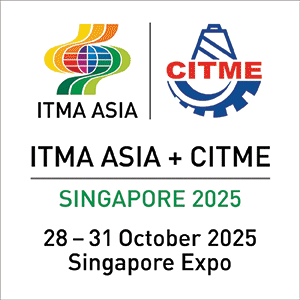 T-shirt made of 100% organic materials.
T-shirt made of 100% organic materials.Lenzing Group, a leading global producer of wood-based specialty fibres, has partnered with technology start-up Exponent Envirotech to introduce ECOHUES, a waterless dyeing technology to wood based cellulosic fibers. The technology, regarded as a possible alternative to conventional water-based dyeing, can be applicable to cotton and linen yarns. Through collaboration with Lenzing, for the first time, ECOHUES is applied to cellulosic fibers, namely TENCEL branded lyocell and modal fibers, as well as LENZING ECOVERO branded viscose fibers, which are certified with the EU Ecolabel for environmental excellence2. Joining forces with Hong Kong-based innovative knitwear manufacturer Cobalt Fashion, the dynamic trio is set to bring the scientific breakthrough to the mainstream textile market.
“At Lenzing, we are constantly collaborating with partners to identify innovative solutions that not only ensure product quality but also strive to reduce usage of our planet’s resources. The collaboration with Exponent Envirotech and Cobalt Fashion is a testament to such dedication, as we bring scalable innovations to the textile value chain,” said Rex Mok, Director of Technical Marketing and Development, Global Textiles Business, Lenzing. “We are excited to incorporate ECOHUESTM a revolutionary dyeing technique, to lyocell, modal and viscose fibers for the first time. With the availability of such technology, we are taking a crucial step towards systematically reforming conventional practices within the textile value chain.
 ECOHUES: an innovative solution that improves resource efficiency and ensures color vibrancy3
ECOHUES: an innovative solution that improves resource efficiency and ensures color vibrancy3
For every ton of yarn, 120 tons of water is required in the traditional dyeing process. This usually involves pretreatment, water-based dyeing, washing, and finishing under a chemically intensive environment. ECOHUES technology effectively replaces the use of water in the dyeing process with a non-aqueous solvent that is 99.8% reusable and streamlines the pre-treatment and finishing processes by nearly removing the need for soap washing after dyeing. This helps to reduce the overall water usage by 95% compared to traditional dyeing methods. The simplified process not only lowers water and energy consumption but also boosts cost effectiveness and production efficiency by significantly reducing the traditional dyeing duration from 12 hours to 6-8 hours.
 Additionally, ECOHUES eliminates the use of salt as a common dyeing assistant to address the industry’s long-standing issue of high salinity in textile wastewater. With a 40% dyestuff saving, ECOHUES greatly reduces the amount of dye required while ensuring a color fixation rate of over 97% which outperforms the average rate of traditional water bath dyeing by more than 30%, maintaining a stable color performance of the yarn. Complementing the use of yarns made of TENCEL and LENZING ECOVERO fibers, which are made with at least 50% less carbon emissions and water consumption4 and further reduce the overall energy and chemical usage compared to cotton by skipping the bleaching process with its natural white colour, it offers a more responsible choice for customers and brand partners.
Additionally, ECOHUES eliminates the use of salt as a common dyeing assistant to address the industry’s long-standing issue of high salinity in textile wastewater. With a 40% dyestuff saving, ECOHUES greatly reduces the amount of dye required while ensuring a color fixation rate of over 97% which outperforms the average rate of traditional water bath dyeing by more than 30%, maintaining a stable color performance of the yarn. Complementing the use of yarns made of TENCEL and LENZING ECOVERO fibers, which are made with at least 50% less carbon emissions and water consumption4 and further reduce the overall energy and chemical usage compared to cotton by skipping the bleaching process with its natural white colour, it offers a more responsible choice for customers and brand partners.
“As a company dedicated to sustainable and energy-optimization solutions for the industry, Exponent Envirotech has been a champion of environmental-friendly innovation since day one,” said Wesley Choi, Chairman, Exponent Envirotech. “This project integrates sustainable production practices with responsible materials, forging a new standard for resource-efficient and environmentally friendly fashion production within the industry.”
 Power of collaboration to systematically reform to conventional practices within the textile value chain
Power of collaboration to systematically reform to conventional practices within the textile value chain
While the ECOHUES technology could be applied to almost all segments including innerwear, ready-to-wear, activewear and footwear in which cellulosic fibers are widely used; knitwear has been chosen as the application to bring the results of the collaboration to life. Produced by Cobalt Fashion, the knitwear collection is crafted with yarn made with Lenzing fibers dyed with ECOHUESTM technology, demonstrating how Lenzing’s cellulosic fibers, when combined with the technology, can enhance the performance of Knitwear, meeting the demands of Consumers who seek both style and sustainability.
“As we strive to lead in sustainable fashion, Cobalt Fashion relentlessly pursues innovative yarns that reduce carbon emissions and water usage while maintaining performance and affordability,” remarked Andrew Dixon, Senior Vice President, Merchandising, Cobalt Fashion. “Non-water dyeing methods often require less energy when compared to conventional dyeing techniques. This energy efficiency can lead to cost savings for textile manufacturers and contribute to a more sustainable industry. This partnership is an important first step as we join hands to create far-reaching impact and bring systematic change across the textile industry.”



 ECOHUES: an innovative solution that improves resource efficiency and ensures color vibrancy3
ECOHUES: an innovative solution that improves resource efficiency and ensures color vibrancy3 Additionally, ECOHUES eliminates the use of salt as a common dyeing assistant to address the industry’s long-standing issue of high salinity in textile wastewater. With a 40% dyestuff saving, ECOHUES greatly reduces the amount of dye required while ensuring a color fixation rate of over 97% which outperforms the average rate of traditional water bath dyeing by more than 30%, maintaining a stable color performance of the yarn. Complementing the use of yarns made of TENCEL and LENZING ECOVERO fibers, which are made with at least 50% less carbon emissions and water consumption4 and further reduce the overall energy and chemical usage compared to cotton by skipping the bleaching process with its natural white colour, it offers a more responsible choice for customers and brand partners.
Additionally, ECOHUES eliminates the use of salt as a common dyeing assistant to address the industry’s long-standing issue of high salinity in textile wastewater. With a 40% dyestuff saving, ECOHUES greatly reduces the amount of dye required while ensuring a color fixation rate of over 97% which outperforms the average rate of traditional water bath dyeing by more than 30%, maintaining a stable color performance of the yarn. Complementing the use of yarns made of TENCEL and LENZING ECOVERO fibers, which are made with at least 50% less carbon emissions and water consumption4 and further reduce the overall energy and chemical usage compared to cotton by skipping the bleaching process with its natural white colour, it offers a more responsible choice for customers and brand partners. Power of collaboration to systematically reform to conventional practices within the textile value chain
Power of collaboration to systematically reform to conventional practices within the textile value chain


















